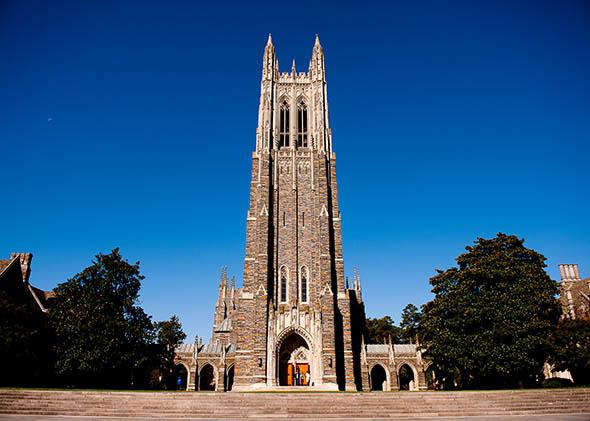Duke University, under pressure from angry Christians, has backed down from a plan to allow a Muslim call to prayer from its chapel tower. Many students and civil libertarians call this rank capitulation. They may be right. But the story is more complicated than it appears.
Let’s be clear: Much of the sentiment behind the Duke backlash is tribal, xenophobic, and stupid. Franklin Graham, the bigoted son of evangelist Billy Graham, stirred things up by accusing Duke of “promoting” Islam while “followers of Islam are raping, butchering, and beheading” unbelievers. Another Islamophobe suggested Duke was trying “to favor religions seemingly at war with Western civilization.” These statements, by conflating Islam with terrorism, lie and foment prejudice.
But the evil and folly of the uprising don’t settle the question of how to respond to it. Evil and folly are social facts. Sometimes you have to take them into account as you work your way toward a better future. That’s true of any social transition, from the civil rights movement to public acceptance of gays and lesbians. These transitions are full of judgment calls, often involving prudence, patience, and finesse. The Duke backlash is arguably one such situation.
First, the question on the table—how to give Muslims a fair and open place to worship on campus—isn’t binary. Muslim students and teachers have been holding services in the chapel for years. As attendance increased, the location moved from smaller rooms to bigger ones. The latest decision, to move the call to prayer from the chapel’s basement to its tower, was a big leap. It didn’t have to be that big. Nor were the other details of the original plan essential. The plan was to allot three minutes for the call, including an Arabic chant and an English translation, with “moderate” amplification. The problem, apparently, was the use of the tower, which made some non-Muslims feel threatened.
When Duke scrapped the tower idea, it didn’t put the call to prayer back in the basement. The revised plan is to conduct the call in a quadrangle next to the chapel. The sound factor appears to be unchanged: Muslim students will be allowed to amplify the call as they see fit. So when students and civil libertarians accuse the school of denying Muslims “the opportunity to openly worship,” that’s just not true.
Second, there’s a plausible case for the revised plan. Many people who objected to the original plan worried that the use of the tower elevated Islam above other faiths, conveying an exclusive imprimatur. That’s a stretch, given Duke’s Christian history, Christian bylaws, and overwhelmingly Christian administration and student body. But it’s reasonable to propose that the iconic tower should stand above all faiths, leaving each to its space below. As one student put it: “Religion is good. But it has its place—inside the chapel.” Any rule that the university applies to all faiths equally, including nonuse of the tower, ought to be open to discussion.
Third, Duke’s administrators may be right that “what was conceived as an effort to unify was not having the intended effect.” Michael Schoenfeld, Duke’s vice president, correctly attributed the unintended backlash to xenophobic delusion and deceit: “The purposes and goals and even the facts had been so mischaracterized as to turn it into a divisive situation.” Omid Safi, the director of Duke’s Islamic Studies Center, put it more bluntly:
We had hoped for a symbolic action that would shine a light on how a leading international university in the American South can be a place where the symbol of the Christian heritage of the university is demonstrating hospitality to its Muslim community members. And instead we’re having to talk about crazy people.
Yes, the backlash is infuriating. Liars, haters, and paranoids shouldn’t run the world. But if your goal is in part to “help [Muslim] students feel more at home in a world marred by weekly acts of violence and daily discriminations”—as Duke administrators stated—maybe the wise course is to advance the ball a few yards at a time, instead of throwing it to the end zone.
Fourth, there may be additional security reasons for patience. Safi and Schoenfeld have cited “credible threats against Muslim students, faculty, and staff.” Safi complains that the university is “caving in” to security concerns, but he adds that the concerns are “very real.” I don’t know the details, and neither do you. But if there’s a reasonable chance that some lunatic who was threatening to kill a Muslim professor can be held off for a couple of days and eventually apprehended, I’m willing to wait.
These arguments don’t excuse the university’s clumsiness. Administrators should have thought through the tower idea more carefully before proposing it. Their failure to do so puts them in a position of reducing Muslim use of public space, exactly the opposite of what they intended. By retreating under pressure, they’ve also empowered Graham and his ilk. They’ve sent the wrong message.
They should send the right one. It’s fine to be prudent about advancing justice. But you have to be clear about what justice is and about your commitment to it. Duke must undertake a long-term campaign, beginning with a speech from its president, to confront Islamophobia among its alumni and in Christian communities across the region. That campaign must teach the truth: Islam, like Christianity, is a diverse faith, full of peaceful adherents. It deserves an equal place on campus and in civil society. That’s where this country is going. And bigots can’t stop it.
